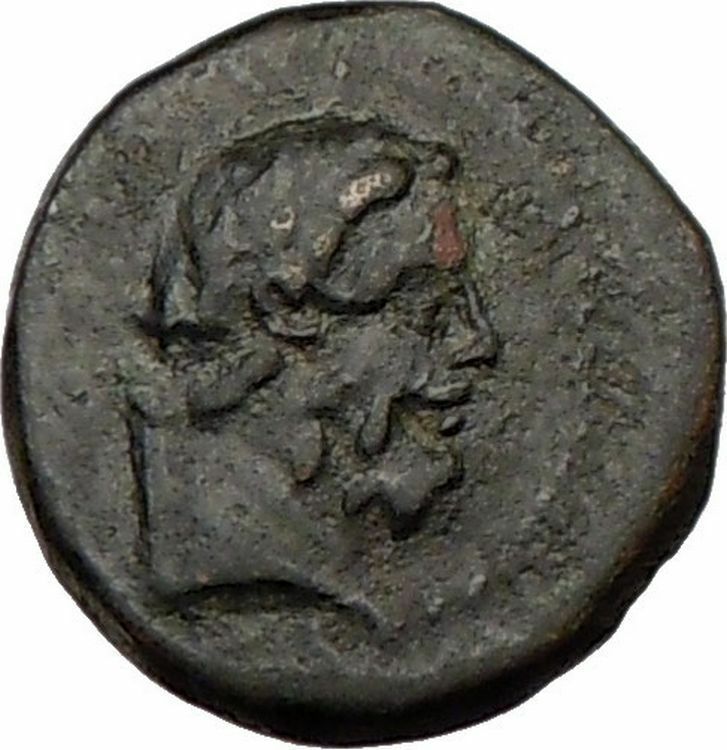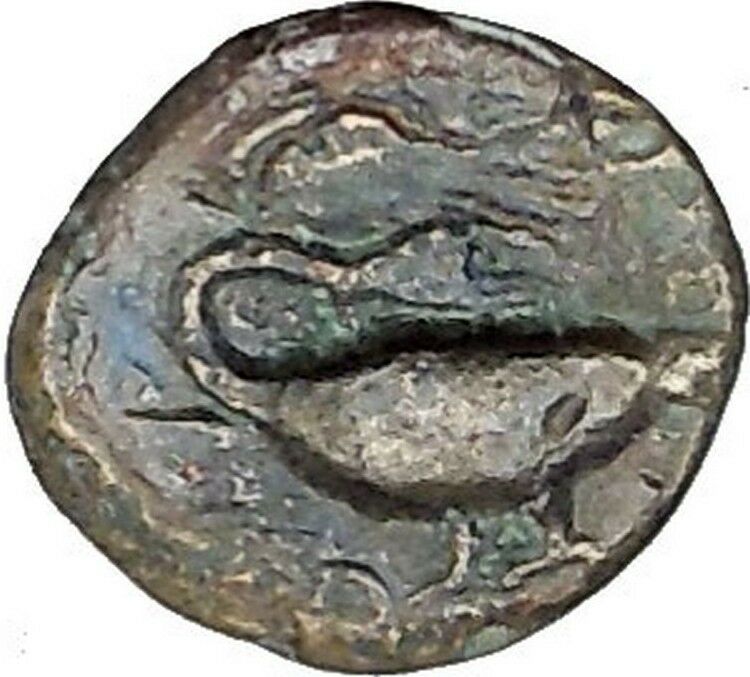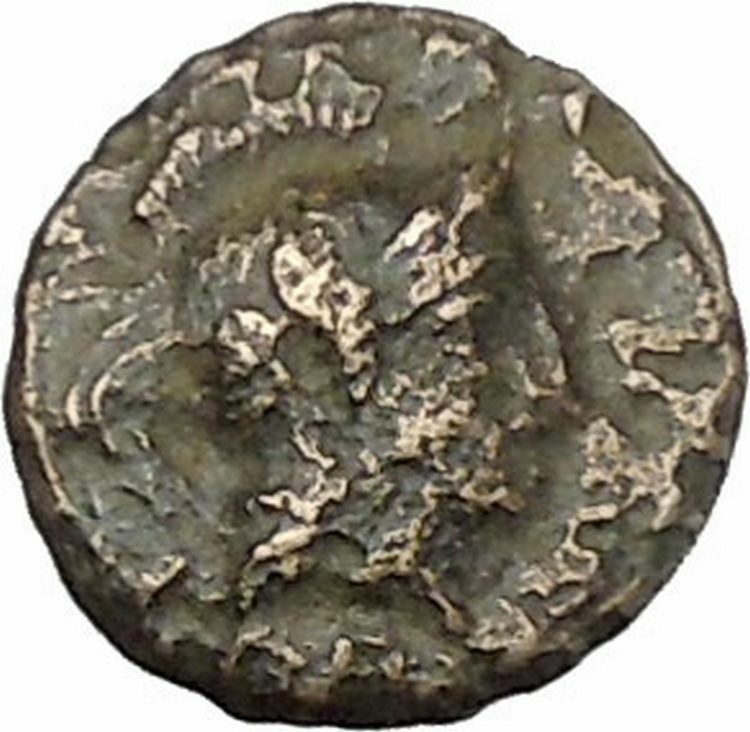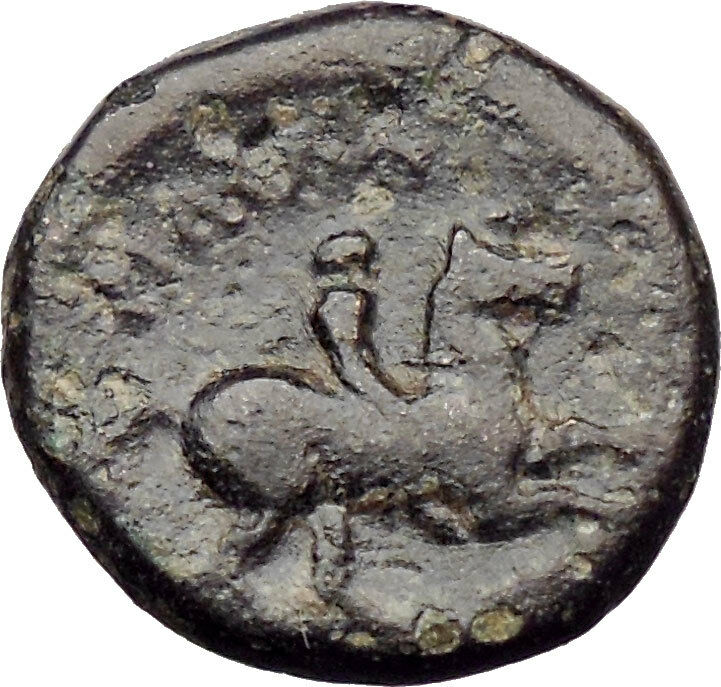|
Seleukid Kindom
Antiochos IX Kyzikenos – King:
113-96 B.C. –
Bronze 18mm (3.40 grams) Struck circa 113-96 B.C.
Reference: HGC 9, 1253 (R2); SC 2379
Laureate head of Apollo right.
ΒΑΣΙΛΕΩΣ AΝΤΙΟΧΟΥ
/ ΦΙΛΟΠΑΤOΡΟΣ, Artemis
standing facing, holding spear and bow;
monograms to left.
You are bidding on the exact item pictured,
provided with a Certificate of Authenticity and Lifetime Guarantee of
Authenticity.

In
Greek
and
Roman mythology
,
Apollo, is one of the most
important and diverse of the
Olympian deities
. The ideal of the
kouros
(a beardless youth), Apollo has been
variously recognized as a god of light and the sun; truth and prophecy;
archery
; medicine and healing; music, poetry,
and the arts; and more. Apollo is the son of
Zeus and Leto
, and has a
twin
sister, the chaste huntress
Artemis
. Apollo is known in Greek-influenced
Etruscan mythology
as Apulu. Apollo was
worshiped in both
ancient Greek
and
Roman religion
, as well as in the modern
Greco
–Roman
Neopaganism
.
As the patron of Delphi
(Pythian Apollo), Apollo was an
oracular
god — the prophetic deity of the
Delphic Oracle
. Medicine and healing were
associated with Apollo, whether through the god himself or mediated through his
son Asclepius
, yet Apollo was also seen as a god
who could bring ill-health and deadly
plague
as well as one who had the ability to
cure. Amongst the god’s custodial charges, Apollo became associated with
dominion over
colonists
, and as the patron defender of herds
and flocks. As the leader of the
Muses (Apollon Musagetes) and director of their choir, Apollo
functioned as the patron god of music and
poetry
.
Hermes
created the
lyre for him, and the instrument became a common
attribute
of Apollo. Hymns sung to Apollo were
called paeans
.
In Hellenistic times, especially during the third century BCE, as Apollo
Helios he became identified among Greeks with
Helios
,
god of the sun
, and his sister Artemis
similarly equated with
Selene
,
goddess of the moon
. In Latin texts, on the
other hand, Joseph Fontenrose declared himself unable to find any conflation of
Apollo with
Sol
among the
Augustan poets
of the first century, not even
in the conjurations of
Aeneas
and
Latinus
in
Aeneid
XII (161–215). Apollo and Helios/Sol
remained separate beings in literary and mythological texts until the third
century CE.
Artemis was one of the most widely venerated of the Ancient Greek
deities. Some scholars believe that the name, and indeed the goddess herself,
was originally pre-Greek. Homer refers to her as Artemis Agrotera,
Potnia Theron
< Artemis of the wildland,
Mistress of Animals”. In the classical period of
Greek mythology
, Artemis (Greek:
(nominative)
Ἄρτεμις, (genitive)
Ἀρτέμιδος) was often
described as the daughter of
Zeus and Leto
, and the twin sister of
Apollo
. She was the Hellenic goddess of the
hunt, wild animals, wilderness, childbirth, virginity and young girls, bringing
and relieving disease in women; she often was depicted as a huntress carrying a
bow and arrows. The deer
and the
cypress
were sacred to her. In later
Hellenistic times, she even assumed the ancient role of
Eileithyia
in aiding childbirth.
Artemis later became identified with
Selene
, a
Titaness
who was a Greek moon goddess,
sometimes depicted with a crescent moon above her head. She was also identified
with the Roman goddess
Diana
, with the
Etruscan
goddess
Artume
, and with the Greek or
Carian
goddess
Hecate
.
Antiochos
IX Kyzikenos, ruler of the
Greek
Seleucid kingdom
, was the son of
Antiochus VII Sidetes
and
Cleopatra Thea
. Upon the death of his father in
Parthia
and his uncle
Demetrius II Nicator’s
return to power (129
BC), his mother sent him to
Cyzicus
on the
Bosporus
, thus giving him his nickname. He
returned to the Seleukid Kingdom in 116 BC to claim the
Seleucid
throne from half-brother/cousin
Antiochus VIII Grypus
, with whom he eventually
divided the kingdom. He was killed in battle by the son of Grypus,
Seleucus VI Epiphanes
in 96 BC.
Seleucid
Empire
Σελεύκεια
Seleúkeia |

|
312 BC–63 BC |
↓
|
|
|
The Seleucid Empire in 301 BC.
|
The Seleucid Empire
was a
Hellenistic
state ruled by the Seleucid dynasty
founded by
Seleucus I Nicator
following the division of
the empire created by
Alexander the Great
. Seleucus received
Babylonia
and, from there, expanded his
dominions to include much of Alexander’s
near eastern
territories. At the height of its
power, it included central
Anatolia
, the
Levant
,
Mesopotamia
,
Kuwait
,
Persia
,
Afghanistan
,
Turkmenistan
, and northwest parts of
India
.
The Seleucid Empire was a major center of
Hellenistic
culture that maintained the
preeminence of
Greek
customs where a Greek-Macedonian
political elite dominated, mostly in the urban areas. The Greek population of
the cities who formed the dominant elite were reinforced by emigration from
Greece
. Seleucid expansion into
Anatolia
and Greece was abruptly halted after
decisive defeats
at the hands of the
Roman army
. Their attempts to defeat their old
enemy
Ptolemaic Egypt
were frustrated by Roman
demands. Much of the eastern part of the empire was conquered by the
Parthians
under
Mithridates I of Parthia
in the mid-2nd century
BC, yet the Seleucid kings continued to rule a
rump state
from
the Seleukid Kingdom
until the invasion by
Armenian
king
Tigranes the Great
and their ultimate overthrow
by the Roman
general
Pompey
.
|











